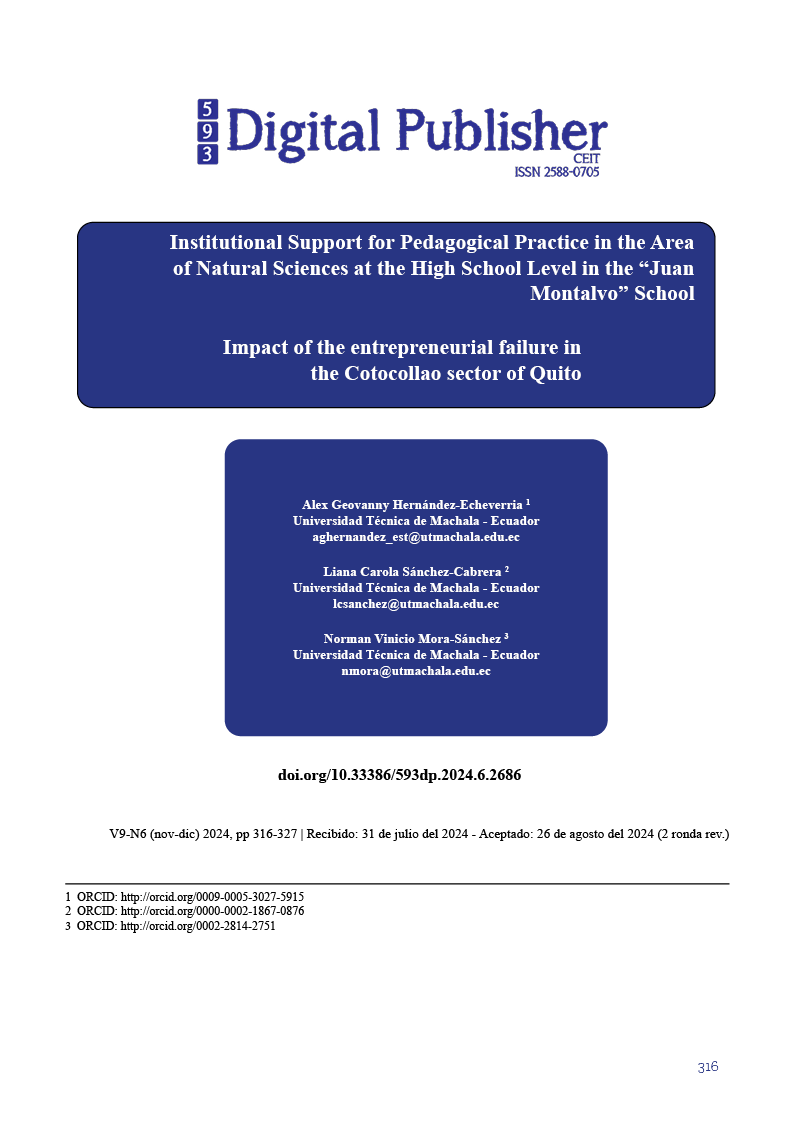Impact of the entrepreneurial failure in the Cotocollao sector of Quito
Main Article Content
Abstract
Entrepreneurship is the most common type of business in Ecuador, but at the same time the one that concentrates the least amount of sales and generates the least amount of employment. Likewise, the evolution of entrepreneurship as a concept includes some substantial changes to its definition, however, the reality is that the figures on entrepreneurial failure are worrisome. This research addresses this dark side of entrepreneurship and the stigmas that are generated around it (self-stigma and social stigma), with the objective of determining the impact of entrepreneurial failure on entrepreneurship in the parish of Cotocollao, Metropolitan District of Quito. A descriptive, non-experimental, cross-sectional, descriptive methodology with a quantitative approach was used. A Google Forms survey was designed for the collection of information. This questionnaire consists of 26 questions. A sample of 384 people was selected using the non-probabilistic casual sampling technique. The main results show that approximately one fifth (20.9%) of the respondents have an active entrepreneurial venture, and almost the entire population (91.8%) consider that this is not a good sector for entrepreneurship, in addition, there are higher levels of self-stigma (explained by the entrepreneur attribute) than social stigma (explained by the entrepreneur attribute and frequency of entrepreneurial failure).
Downloads
Article Details

This work is licensed under a Creative Commons Attribution-NonCommercial-ShareAlike 4.0 International License.
1. Derechos de autor
Las obras que se publican en 593 Digital Publisher CEIT están sujetas a los siguientes términos:
1.1. 593 Digital Publisher CEIT, conserva los derechos patrimoniales (copyright) de las obras publicadas, favorece y permite la reutilización de las mismas bajo la licencia Licencia Creative Commons 4.0 de Reconocimiento-NoComercial-CompartirIgual 4.0, por lo cual se pueden copiar, usar, difundir, transmitir y exponer públicamente, siempre que:
1.1.a. Se cite la autoría y fuente original de su publicación (revista, editorial, URL).
1.1.b. No se usen para fines comerciales u onerosos.
1.1.c. Se mencione la existencia y especificaciones de esta licencia de uso.
References
Acta Resolutiva No. 29-PLE-CNE-2024. (5 de abril de 2024). Consejo Nacional Electoral. https://www.cne.gob.ec/wp-content/uploads/2024/04/R-5-ABRIL-2024-FINAL-AO-signed.pdf
Aguilar-Benages, C., Córcoles-Cebrián, D., Lucas-Miralles, M., Almela-Manuel, P., Heredia-Nebot, S., Fontestad-Gómez, J., & Molés-Julio, M. (2023). El estigma asociado a los trastornos mentales en el paciente geriátrico: una revisión integradora. Gerokomos, 33(3), 175-179. https://scielo.isciii.es/scielo.php?script=sci_arttext&pid=S1134-928X2022000300008
Alves, J., & Yang, W. (2022). Cognitive Mechanisms in Entrepreneurship Competence: Its Implication for Open Innovation. Journal of Open Innovation: Technology, Market, and Complexity, 8(2), 1-31. https://doi.org/10.3390/joitmc8020065
Arrogante, O. (2022). Técnicas de muestreo y cálculo del tamaño muestral: Cómo y cuántos participantes debo seleccionar para mi investigación. Enfermería Intensiva, 33(1), 44-47. https://doi.org/10.1016/j.enfi.2021.03.004
Bachmann, N., Tripathi, S., Brunner, M., Jodlbauer, H., & Piereder, A. (2024). Cross-Impact Analysis of Entrepreneurial Failure and Business Model Innovation: Navigating the Impact of Societal Perceptions. Procedia Computer Science, 232, 2639-2653. https://doi.org/10.1016/j.procs.2024.02.082
Bermeo, S., & Canobbio, C. (2020). El desarrollo tecnológico industrial en el proceso de urbanización de la ciudad de Quito. FIGEMPA: Investigación y Desarrollo, 1(1), 47-59. https://doi.org/10.29166/revfig.v1i1.2244
Cahn, C., Girotti, M., & Landier, A. (2021). Entrepreneurship and information on past failures: A natural experiment. Journal of Financial Economics, 141(1), 102-121. https://doi.org/10.1016/j.jfineco.2020.06.021
Castelló, I., Barberá-Tomás, D., & Vaara, E. (2023). Moving on: Narrative identity reconstruction after entrepreneurial failure. Journal of Business Venturing, 38(4). https://doi.org/10.1016/j.jbusvent.2023.106302
Cevallos, H., Herrera, E., Montalvo, X., & Terán, I. (2022). What Causes the Failure of Enterprises in the City of Riobamba? ESPOCH Congresses: The Ecuadorian Journal of S.T.E.A.M., 2(6), 1490–1499. https://doi.org/10.18502/espoch.v2i6.12203
Costa, P., Ferreira, J., & Torres, R. (2023). From entrepreneurial failure to re-entry. Journal of Business Research, 158, 1-17. https://doi.org/10.1016/j.jbusres.2023.113699
Instituto Nacional de Estadística y Censos. (abril de 2024). Registro Estadístico de Empresas. https://www.ecuadorencifras.gob.ec/documentos/web-inec/Estadisticas_Economicas/Registro_Empresas_Establecimientos/2023/Semestre_I/Boletin_REEM_2023.pdf
Jenkins, A. (2021). Relief and exploration after firm failure: Taking into account pre-failure experiences to understand post-failure responses. Journal of Business Venturing Insights, 15. https://doi.org/10.1016/j.jbvi.2021.e00226
Maiza, C., Rivera, P., & Morales, D. (2020). El fracaso de la actividad emprendedora en el contexto latinoamericano. Uniandes Episteme, 7(2), 162-176. https://revista.uniandes.edu.ec/ojs/index.php/EPISTEME/article/view/1490
Manzano, L., de Luna, D., Moctezuma, J., & Luna, S. (2020). Intención emprendedora. Entre el idealismo y la obligatoriedad. Revista de El Colegio de San Luis, 10(21), 5-30. https://doi.org/10.21696/rcsl102120201227
Mayorga, J., Morales, D., & Carvajal, R. (2020). Entrepreneurship and gender: a comparative perspective of Latin America and Ecuador. Revista Espacios, 41(3), 15-21. https://www.revistaespacios.com/a20v41n03/a20v41n03p15.pdf
Padilla, C. (2023). Los estudiantes que sobran: Motivaciones y causas del fracaso escolar en jóvenes estudiantes chilenos. Revista Chakiñan de Ciencias Sociales y Humanidades(19), 24-43. https://doi.org/10.37135/chk.002.19.01
Patzelt, H., Gartzia, L., Wolfe, M., & Sheperd, D. (2021). Managing negative emotions from entrepreneurial project failure: When and how does supportive leadership help employees? Journal of Business Venturing, 36(5), 1-19. https://doi.org/10.1016/j.jbusvent.2021.106129
Quito: los robos y asaltos se reportan todas las semanas en Cotocollao. (5 de septiembre de 2023). Ecuavisa. https://www.ecuavisa.com/noticias/quito/robos-asaltos-cotocollao-policia-inseguridad-DL5915445
Rawal, A., Sarpong, D., & Kumar, S. (2023). Phoenix rising: Rebounding to venture again post firm-failure. Industrial Marketing Management, 112, 71-84. https://doi.org/10.1016/j.indmarman.2023.05.007
Terán, A., & Torres, A. (2020). Capacidades de emprendimiento e innovación: el caso de una empresa biofarmacéutica en México. Revista Espacios, 41(19), 230-247. https://www.revistaespacios.com/a20v41n19/a20v41n19p16.pdf
Torres, J., & Synch, B. (2022). Desarrollo De Microemprendimientos En Programas De Vivienda Popular, Caso De El “Recreo”. Cantón Duran. Revista Económica, 10(2), 34-43. https://doi.org/10.54753/rve.v10i2.1331
Vélez, C., Jácome, J., & Bermúdez, C. (2020). Actitud emprendedora en América Latina y Ecuador: Una revisión del informe Global Entrepreneurship Monitor y estudios previos. Revista Compendium: Cuadernos de Economía y Administración, 7(1), 12-21. https://doi.org/10.46677/compendium.v7i1.780
Velez, M. (2024). Análisis teórico de la evolución del delito de extorsión como fenómeno criminal en el Ecuador. Polo del Conocimiento, 9(3), 707-726. https://doi.org/10.23857/pc.v9i3.6675




